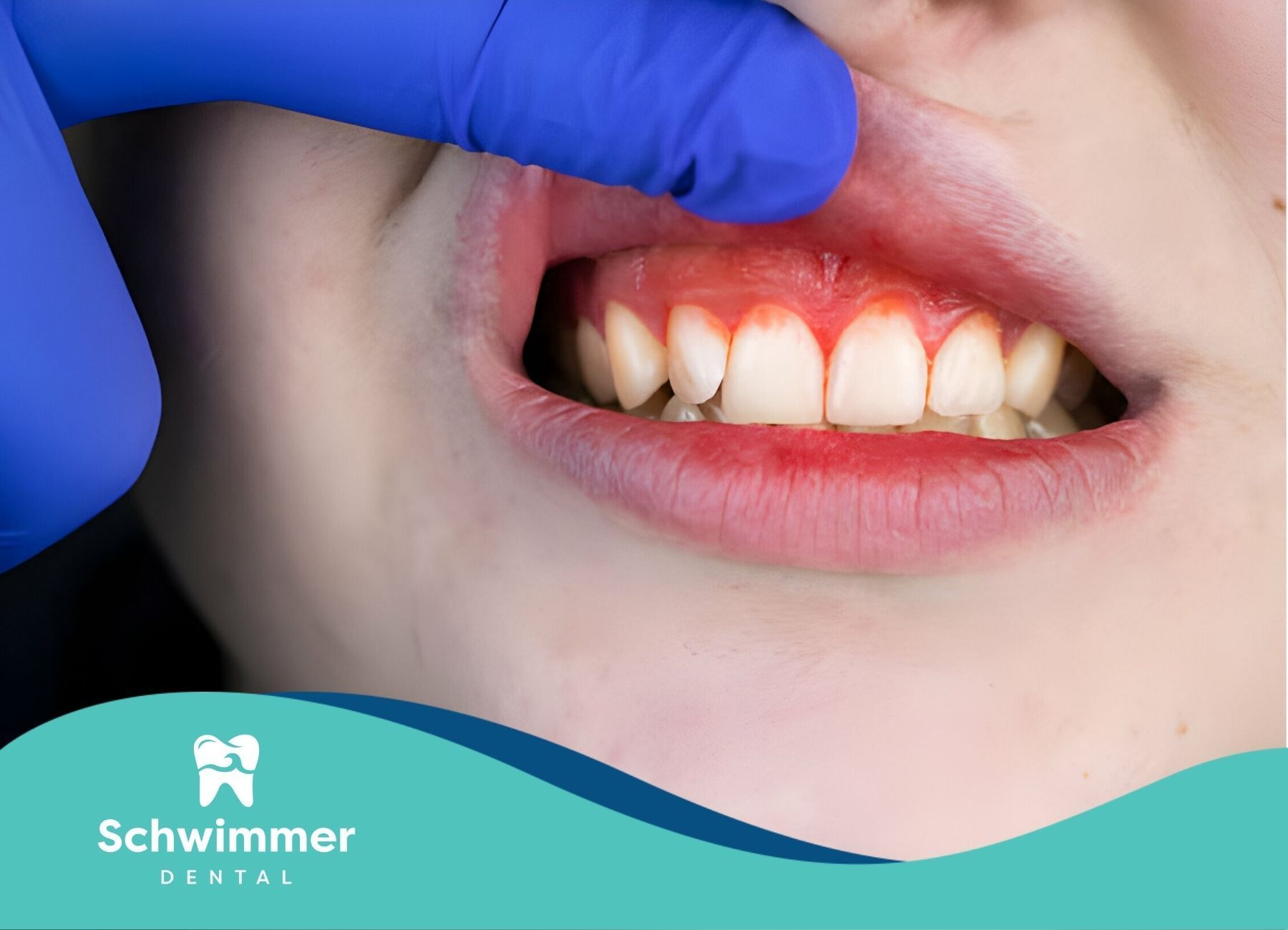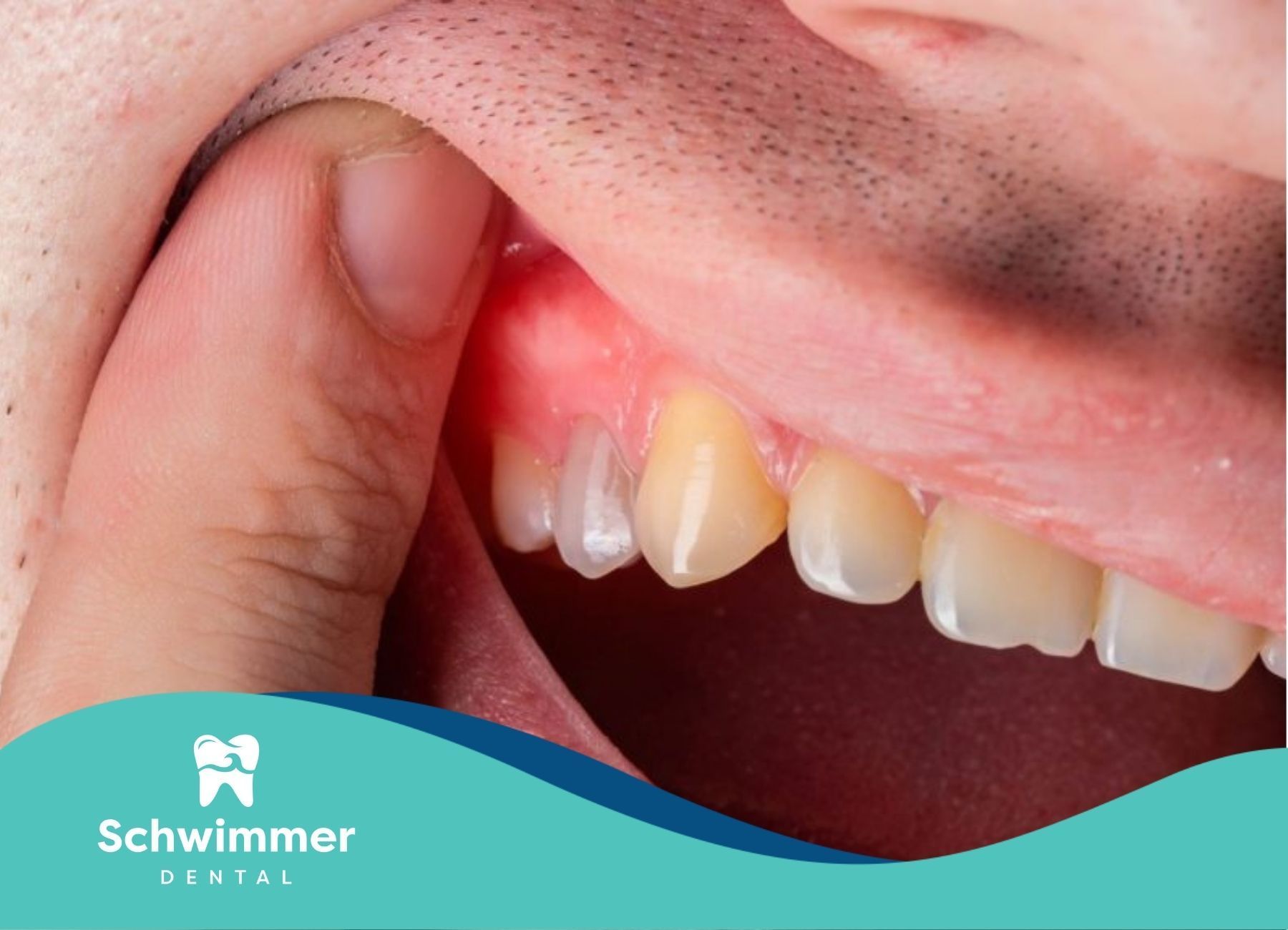Have an appointment? Complete the Intake Form
The Best Home Remedies for Swollen Gums You Need to Know
Understanding Swollen Gums
Swollen gums, also known as gingival swelling, can be a common yet uncomfortable oral health issue. Understanding the causes and impact of swollen gums is essential for effective management and prevention.
Causes of Swollen Gums
Swollen gums can result from various factors, including bacterial infections, gum tissue irritation, and malnutrition. Here are some common causes:
- Bacterial Infection: Gingivitis, the most common form of gum disease, typically occurs due to bacterial infection of the gum tissue. Poor oral hygiene can lead to plaque buildup around the tooth base, causing infection and inflammation.
- Gum Tissue Irritation: Irritation from dental appliances, such as braces or ill-fitting dentures, can cause the gums to swell. Additionally, aggressive brushing or flossing can damage the gum tissue, leading to swelling.
- Malnutrition: Deficiencies in essential nutrients, particularly vitamins C and D, can weaken the immune system and make the gums more susceptible to swelling and infection.
Other specific causes include hormonal changes during pregnancy, medication side effects, and food particles trapped in the gums. For more detailed information, visit our article on swollen gums causes.
Impact of Swollen Gums
Swollen gums can have several negative effects on oral health and overall well-being. Some of the common impacts include:
- Pain and Discomfort: Swollen gums are often irritated, sensitive, or painful, making it difficult to eat, drink, or perform oral hygiene routines comfortably.
- Bleeding: Swollen gums may bleed easily, especially during brushing or flossing. This can be a sign of underlying gum disease and should not be ignored.
- Bad Breath: Infections and plaque buildup associated with swollen gums can lead to persistent bad breath, which can be embarrassing and affect social interactions.
- Tooth Loss: If left untreated, conditions like gingivitis can progress to periodontitis, a more severe form of gum disease that can result in tooth loss.
Understanding the causes and impact of swollen gums is crucial for effective management. For more information on specific causes, visit our articles on reasons for swollen gums and swollen gums and bleeding.
Common Swollen Gums Causes
Swollen gums, also known as gingival swelling, can be caused by various factors. Understanding these causes is essential for effective treatment and prevention. Here are some common causes of swollen gums.
Bacterial Infection
Bacterial infection is a
primary cause of swollen gums. Gingivitis, the most common form of gum disease, typically occurs due to bacterial infection of the gum tissue. Without proper dental hygiene, plaque can build up around the tooth base, leading to infection and inflammation. This can result in gums that are irritated, sensitive, or painful.
| Cause | Description |
|---|---|
| Gingivitis | Inflammation of the gums due to plaque buildup |
| Periodontitis | Advanced gum disease affecting the bone and tissues supporting the teeth |
For more information on how bacterial infections can lead to swollen gums, visit our page on swollen gums around tooth.
Gum Tissue Irritation
Gum tissue irritation is another common cause of swollen gums. This can occur due to various factors, including:
- Improper Brushing or Flossing: Aggressive brushing or flossing can irritate the gum tissue, leading to swelling.
- Dental Appliances: Ill-fitting dentures or braces can rub against the gums, causing irritation and inflammation.
- Tobacco Use: Smoking or chewing tobacco can irritate the gums and contribute to swelling.
| Irritant | Effect on Gums |
|---|---|
| Aggressive Brushing | Causes physical irritation and swelling |
| Ill-Fitting Dentures | Rubbing against gums, leading to inflammation |
| Tobacco Use | Chemical irritation and increased risk of infection |
Malnutrition and Gum Swelling
Malnutrition can also lead to swollen gums. A deficiency in essential nutrients, particularly vitamins, can affect gum health. For instance, a lack of vitamin C can cause scurvy, which is characterized by swollen and bleeding gums.
| Nutrient Deficiency | Effect on Gums |
|---|---|
| Vitamin C | Leads to scurvy, causing swollen and bleeding gums |
| Vitamin D | Affects calcium absorption, impacting gum health |
| Iron | Deficiency can lead to anemia, affecting gum tissue health |
Ensuring a balanced diet rich in vitamins and minerals is crucial for maintaining healthy gums. Understanding these common causes of swollen gums can help in identifying the underlying issues and taking appropriate measures to address them.
Specific Causes of Swollen Gums
Swollen gums can be caused by various factors, some of which are specific to certain conditions or situations. Understanding these specific causes can help in identifying the appropriate swollen gums home remedies and preventive measures.
Pregnancy and Hormonal Changes
Hormonal changes during pregnancy can significantly impact oral health. While pregnancy itself does not directly cause swollen gums, the hormonal fluctuations can alter the mouth’s environment, making infections more likely. Increased blood flow to the gums during pregnancy can make them more sensitive, easily irritated, and prone to swelling.
| Hormonal Change | Effect on Gums |
|---|---|
| Increased Blood Flow | Sensitivity and Swelling |
| Altered Mouth Environment | Higher Infection Risk |
Medication Side Effects
Certain medications can have side effects that include swollen gums. These medications may cause gum overgrowth or increase the risk of gum infections. Common medications that can lead to swollen gums include:
- Anticonvulsants
- Immunosuppressants
- Calcium channel blockers
These medications can cause the gum tissue to become inflamed and swollen, making it essential to maintain good oral hygiene and consult with a healthcare provider if swelling occurs.
Food Particles and Gum Irritation
Food particles trapped between teeth and gums can lead to irritation and swelling. This is particularly common with hard or sticky foods that are difficult to remove through regular brushing and flossing. When food particles remain lodged in the gums, they can cause bacterial growth, leading to inflammation and swelling.
| Food Type | Potential Effect |
|---|---|
| Hard Foods (e.g., nuts) | Physical Irritation |
| Sticky Foods (e.g., candy) | Bacterial Growth |
New Paragraph
| Nutrient | Food Sources |
|---|---|
| Vitamin C | Broccoli, Bell Peppers, Oranges, Pineapples, Kale, Kiwi, Strawberries |
| Calcium | Dairy, Soy Milk, Tofu, Sardines, Cereals, Collard Greens |
| Folic Acid | Beans, Lentils, Broccoli, Asparagus, Greens, Peas, Avocados |
By incorporating these nutrients into your diet, you can help prevent and reduce gum inflammation.
These home remedies can provide relief and promote the healing of swollen gums. Remember to maintain good oral hygiene and consult a dentist if the symptoms persist.
Preventive Measures
Taking preventive measures can help avoid the discomfort and complications associated with swollen gums. Here are some effective strategies to maintain healthy gums.
Oral Health Habits
Maintaining good oral hygiene is crucial in preventing gum issues such as gingivitis. According to the
Mayo Clinic, brushing teeth at least twice a day, flossing daily, and attending regular dental checkups can prevent and reverse gingivitis. These habits help remove plaque, a sticky film of bacteria that can cause gum inflammation.
| Oral Health Habit | Frequency |
|---|---|
| Brushing Teeth | At least twice a day |
| Flossing | Daily |
| Dental Checkups | Every 6 months |
Vitamin-Rich Diet
A diet rich in essential vitamins can significantly impact gum health. Vitamin deficiencies, especially in vitamins B and C, can lead to gum swelling. Low levels of vitamin C, for instance, can cause scurvy, leading to anemia and gum disease.
| Vitamin | Food Sources | Benefits for Gums |
|---|---|---|
| Vitamin C | Citrus fruits, strawberries, bell peppers | Prevents scurvy, promotes gum health |
| Vitamin B | Whole grains, meat, eggs | Supports overall oral health |
Incorporating these vitamins into your diet can help maintain healthy gums and prevent swelling.
Natural Ingredients for Gum Health
Using natural ingredients can also help maintain gum health and prevent swelling. Turmeric, for example, contains antioxidant and anti-inflammatory properties that can reduce gum swelling and pain. A turmeric paste can be made using 1/4 teaspoon of turmeric mixed with a little water. Apply the paste to the affected gums, leave it on for 5 minutes, and rinse with warm water. Repeat daily for 1 to 2 weeks.
Aloe vera is another effective natural remedy. Aloe vera mouthwash is as effective as chlorhexidine, a prescription gingivitis treatment, in curing and preventing gingivitis. Tea tree oil, known for its anti-inflammatory and antibiotic properties, can also be used as a mouthwash to help with painful gums.
By incorporating these preventive measures into your daily routine, you can maintain healthy gums and reduce the risk of swelling and other gum-related issues.
SOURCES:
https://www.healthline.com/health/gums-swollen
https://www.medicalnewstoday.com/articles/swollen-gums
https://www.healthline.com/health/home-remedies-for-swollen-gums
https://www.mayoclinic.org/diseases-conditions/gingivitis/symptoms-causes/syc-20354453
https://my.clevelandclinic.org/health/diseases/24907-swollen-gums
Need Assistance? We’re Here to Help
We are dedicated to enhancing your dental health and well-being.
We provide personalized dental care solutions for a confident, healthy smile.
Contact us today for Professional Dental Care.

Our caring staff will help you feel relaxed and comfortable in our state of the art office. We respect your time and pledge to deliver prompt service, backed by the latest knowledge, techniques, and technology.
Email: Office@schwimmerdental.com
Tel: (848) 294-2385
Fax: (732) 899-3347
Address: 1115 Arnold Ave,
Point Pleasant, NJ, 08742
Schwimmer Dental – Website by CWS


